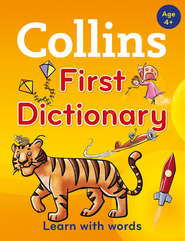По всем вопросам обращайтесь на: info@litportal.ru
(©) 2003-2025.
✖
Collins Gem Croatian Phrasebook and Dictionary
Автор
Год написания книги
2019
Настройки чтения
Размер шрифта
Высота строк
Поля
Eating out
Eating places (#litres_trial_promo)
Reading the menu (#litres_trial_promo)
In a restaurant (#litres_trial_promo)
Vegetarian (#litres_trial_promo)
Wines and spirits (#litres_trial_promo)
Menu reader
Grammar
Public holidays
Dictionary (#litres_trial_promo)
English-Croatian (#litres_trial_promo)
Croatian-English (#litres_trial_promo)
About the Publisher
Pronouncing Croatian (#uac560809-19e8-5e97-898d-bfba9b5a3723)
Spelling and pronouncing Croatian are easy once you know the few basic rules. Each letter is pronounced separately and each word is spelt as it is pronounced. In shorter words, you usually stress the first syllable. In longer words, you rarely stress the last syllable. Each part of a word is pronounced without reducing or contracting sounds.
The Croatian alphabet has 30 letters. Vowel sounds are pure and tend to be longer than in English.
The pronunciation of the consonants below is similar to their English equivalents:
b bed, d dog, f fish, g good, k duck, I lock, m man, n not, p top, s some, t talk, v vase, z zero.
Consonants to watch out for are:
Take care with the following combinations when j sounds like the English y:
Top ten tips (#uac560809-19e8-5e97-898d-bfba9b5a3723)
1 In Croatia the blood alcohol limit for driving is 0%.
2 It is not necessary to tip taxi drivers. In expensive restaurants a tip of 10-15% is expected, while café and bar bills can be rounded up.
3 Croatia has a long tradition of naturist tourism; the first naturist holidays date from 1934.
4 The Italian influence is apparent in many historical sites (churches, cathedrals, squares, city walls, citadels, old houses etc) all over Istria, Kvarner and Dalmatia. Italian is the official second language in Istria and the influence of the language is apparent in the Adriatic coastal areas as well.
5 In Croatia, holidays are celebrated with typical national dishes: cod is prepared for Christmas Eve and Good Friday and pork or turkey is eaten on New Yearâs Day.
6 If you are offered something to eat, it is more polite to say âI cannotâ (ne mogu) than âno thank youâ (ne, hvala vam).
7 If you are invited to join your neighbour/a local on their veranda or in their garden for a drink, it is polite to accept and spend a little time chatting with them.
8 In the old town of Dubrovnik you will find lots of restaurant and shop signs advertised on the street lamps.
9 People normally shake hands upon meeting and parting and they also kiss each other if they are relatives or in a close relationship.
10 There are some signs of Mediterranean characteristics in Croatians: people speak loudly in the green markets and promenades and sometimes can be noisy in the streets and on the beaches as well.
Talking to people (#uac560809-19e8-5e97-898d-bfba9b5a3723)
Hello/goodbye, yes/no (#ulink_7b606328-ca65-5274-86d6-b8a68f9072c4)
Croats can be quite formal in their greeting. If you donât know someone well, the best greeting is dobar dan (literally good day). If you are slightly unsure how formal to be bok is a good option.
> Dictionary (#litres_trial_promo)
Key phrases (#ulink_ccbf3b87-38cd-5850-8e2d-6c12c2c0b977)
Signs and notices (#ulink_8005be1e-5c18-509c-9867-19597ced46b4)
> Dictionary (#litres_trial_promo)
Polite expressions (#ulink_784472e9-6190-53c2-a3cd-8c8f60d0c921)
There are two forms of address in Croatian: formal (vi) and informal (ti). You should always stick to the formal until you are invited to use the informal.
Celebrations (#ulink_0d0c05b6-1b62-5910-ab52-a82aea6eee08)
> Dictionary (#litres_trial_promo)
Making friends (#ulink_3101a8b5-7a5d-5a87-bdba-f253f7627111)
In this section we have used the familiar form âtiâ for the questions.
Weather (#ulink_c6e2b1db-2199-5054-9d20-c64934af691e)
> Dictionary (#litres_trial_promo)
Getting around (#ulink_c6e2b1db-2199-5054-9d20-c64934af691e)
Asking the way (#ulink_b62dd9b7-55f3-5886-84ca-0e177659ee0b)
Вы ознакомились с фрагментом книги.
Приобретайте полный текст книги у нашего партнера:
Приобретайте полный текст книги у нашего партнера:











